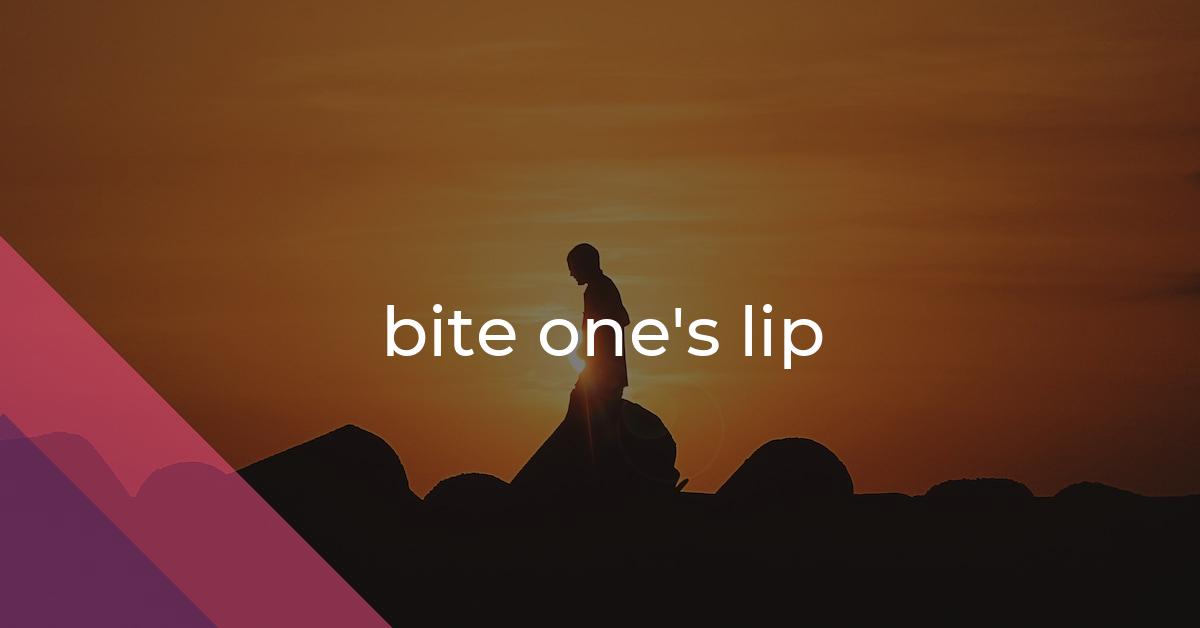bite one’s lip: Idiom Meaning and Origin
What does ‘bite one's lip’ mean?
The idiom bite one's lip means to suppress one's feelings or emotions, usually by remaining silent or not expressing one's true thoughts or opinions.

Idiom Explorer
The idiom "keep quiet" means to remain silent or not speak, especially when it is important to do so in order to maintain secrecy, avoid trouble, or not reveal information.
The idiom "keep one's mouth shut" means to remain silent or not reveal information, often to avoid causing trouble or trouble for oneself. It emphasizes the importance of not speaking or disclosing something that should remain secret or private.
The idiom "keep one's lips sealed" means to keep quiet or not reveal a secret or confidential information.
The idiom "hold one's tongue" means to not speak or to remain silent, typically when faced with a situation where speaking might be inappropriate or cause trouble.
The idiom "hold one's peace" means to remain silent or refrain from speaking, especially when it is important or expected to do so.
The idiom "hold one's jaw" means to remain silent or not speak, often in a situation where one has strong opinions or wants to share their thoughts. It implies control over one's words or emotions.
The idiom "have a bite" means to eat a small amount of food, often as a snack or to taste something. It implies taking a quick break to satisfy hunger or try a small portion of something.
The idiom "find one's tongue" means to finally be able to speak or express oneself after being initially speechless or hesitant.
The idiom "fat lip" refers to a swollen or bruised lip, usually caused by a physical injury or a fight. It is used figuratively to describe a situation where someone is metaphorically silenced or embarrassed by someone else's words or actions.
The idiom "eat one's feelings" means to cope with emotions or stress by indulging in comfort food or excessive eating, as a way of temporarily relieving emotional pain or distress.
"Silent Suffering: Lip-Biting's Essence"
An idiomatic expression commonly used in the English language is "bite one's lip". This figurative phrase does not have a literal meaning but instead symbolizes the act of suppressing emotions or thoughts. It can be used to describe someone restraining themselves from speaking out, holding back their emotions during difficult situations, or enduring pain without showing it.
The metaphorical sense of "bite one's lip" implies self-restraint and the choice to keep one's words or reactions to themselves to avoid conflict or vulnerability. The idiom has a conversational and friendly tone, allowing individuals to convey the concept of self-control and emotional suppression.
The etymology of this phrase is simple, drawing from the literal action of physically biting one's lip and extending it to a metaphorical meaning. While the origins of the phrase may not be complex or historically significant, it has become a common expression in everyday English language usage.
In addition to the idiom "bite one's lip", there are related idioms that have similar meanings and usage. These idioms include "bite one's tongue", "button one's lip" and "hold one's tongue".
Similar to "bite one's lip", the idiom "bite one's tongue" also represents the act of restraining oneself from speaking out. It suggests the choice to remain silent, especially during tense or heated discussions, to avoid causing conflict or worsening the situation.
Another related idiom is "button one's lip". This expression emphasizes the act of closing one's mouth and refraining from speaking. It implies a deliberate choice to keep one's thoughts or opinions to oneself, often for the sake of maintaining harmony or avoiding controversy.
The idiom "hold one's tongue" has a similar meaning to "bite one's lip" and suggests the act of keeping silent or refraining from speaking. Just like "bite one's lip", this idiom implies self-restraint and the conscious decision to withhold one's words or reactions, often to prevent conflict or maintain composure.
With these related idioms, there is a common theme of self-restraint and the choice to hold back one's words or reactions. Whether it is biting one's lip, biting one's tongue, buttoning one's lip, or holding one's tongue, the underlying message remains the same - the act of controlling oneself and avoiding unnecessary conflict or discomfort.
These idioms are often used interchangeably in various contexts. They can be used to describe individuals choosing to suppress their emotions or thoughts in tense or difficult situations. Whether it is in a conversation, argument, or personal encounter, these idioms offer a way to describe the act of restraining oneself from speaking out or revealing one's true feelings.
As an experienced Editor for HubSpot, it is important to edit articles for clarity, structure, and style. Following the AP style guidelines, the articles are edited to remove introductory or summary paragraphs, use short and concise sentences, and ensure a conversational and informal tone. Transitional phrases are eliminated, and paragraphs are kept to 2-3 sentences to improve readability.
When editing articles, it is essential to adhere to the rules and guidelines while also considering the intended audience. Writing in a friendly and approachable manner, using simple language and varied vocabulary, allows the article to connect with readers and convey the desired message effectively.
Overall, the idiom "bite one's lip" and its related idioms "bite one's tongue", "button one's lip", and "hold one's tongue" share a common theme of self-restraint and the choice to suppress one's words or reactions. These idioms reflect the complexities of human emotions and communication, offering individuals a way to describe their experiences and interactions in various situations.
Example usage
Examples of how the idiom "bite one's lip" can be used in a sentence:
1. When the teacher criticized his work, he had to bite his lip to keep from arguing.
2. After receiving disappointing news, she bit her lip to prevent herself from crying.
3. Despite feeling frustrated, he bit his lip and continued to politely listen to the long-winded conversation.
More "Expression" idioms



